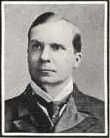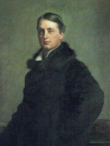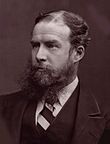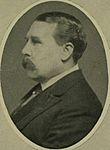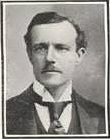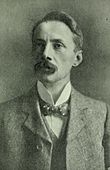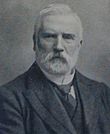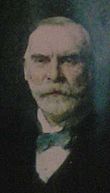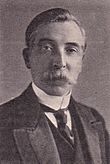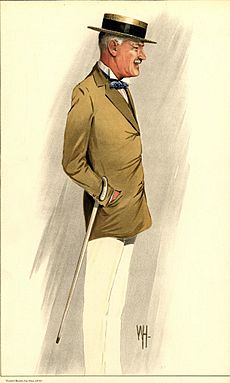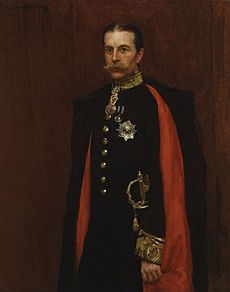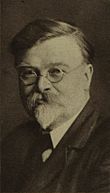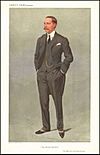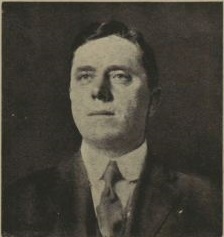List of chairmen of the London County Council facts for kids
This is a list of persons who held the offices of chairman, vice chairman and deputy chairman of the London County Council. All three offices existed from 1889 to 1965.
Contents
Background
The chairmanship and vice chairmanship were statutory offices created by the Local Government Act 1888. Both of these positions were generally filled by members of the majority party. The chairman chaired meetings of the council, and was the county's civic leader, filling a similar role to the mayor of a borough or city. The vice chairman performed these functions in his or her absence.
As part of the celebrations of the silver jubilee of George V in 1935 it was announced that the chairman would in future be entitled to use the style "right honourable", an honour already enjoyed by the Lord Mayor of London.
The council's standing orders also provided for the post of deputy chairman. This was initially a salaried position created to supervise the administration of the local authority. In 1894 the Royal Commission on the Amalgamation of the City and County of London strongly recommended that a clerk be appointed, independent of the parties on the council, as was the practice in municipal boroughs. A county clerk was duly appointed in 1895, and the deputy chairmanship became ceremonial. The office was filled by nominees of the opposition party on the council.
On 1 April 1965 the London County Council was abolished, with its successor authority being the Greater London Council.
Regalia
The chairman had no badge of office until 1927. In 1909 the council had decided that no badge or device should be worn by the chairman. By 1926 the number of formal occasions attended by the chairman had increased, and it was felt that he was at a distinct disadvantage due to not having a distinguishing mark to indicate his office. In 1927 Major Lewis-Barned, councillor for South Paddington, agreed to cover the cost of a badge. The badge was made by an instructor at the Central School of Arts and Crafts and featured the council's coat of arms within an oval of London Pride. The badge was worn on a ribbon in a distinctive barry wavy argent and azure pattern derived from the arms. In 1950 similar, but smaller, badges were acquired for the use of the vice and deputy chairmen.
1889–1899
| Civic year | Chairman | Vice chairman | Deputy chairman |
|---|---|---|---|
| 1889 | Earl of Rosebery | Sir John Lubbock | Joseph Firth Bottomley Firth (Died September 1889) Office vacant September – November 1889 |
| 1889–1890 | Earl of Rosebery Sir John Lubbock (July 1890) |
Sir John Lubbock Thomas Farrer |
Alfred H Haggis |
| 1890–1891 | Sir John Lubbock | Thomas Farrer | Alfred Haggis (Died November 1891) Office vacant November 1891 – March 1892 |
| 1891–1892 | |||
| 1892–1893 | Earl of Rosebery John Hutton (July 1892) |
John Hutton Charles Harrison (July 1892) |
Willoughby Dickinson |
| 1893–1894 | John Hutton | Charles Harrison | Willoughby Dickinson |
| 1894–1895 | Sir John Hutton | Charles Harrison | Willoughby Dickinson |
| 1895–1896 | Sir Arthur Arnold | John Benn | Willoughby Dickinson |
| 1896–1897 | Sir Arthur Arnold | Dr William Job Collins | Melvill Beachcroft |
| 1897–1898 | Dr William Job Collins | Melvill Beachcroft | Andrew Mitchell Torrance |
| 1898–1899 | Thomas McKinnon Wood | Lord Welby | Henry Percy Harris |
- Note a: The Earl of Rosebery resigned, and the vice chairman, Sir John Lubbock was elected in his place in July 1890. The vice chairmanship then became vacant, being eventually filled by Sir Thomas Farrer.
- Note b: The three office holders all made clear their intention to resign at the end of October 1891. However, following unanimous representations from the members of the council, all agreed to continue until the next elections in March 1892. Therefore, no elections to the offices were made in 1891.
- Note c: Rosebery resigned as chairman in the Summer of 1892, becoming Foreign Secretary in the Fourth Gladstone Ministry. Hutton was elected chairman and Harrison replaced him as Vice Chairman.
- Note d: Knighted in 1894.
1899–1909
| Civic year | Chairman | Vice chairman | Deputy chairman |
|---|---|---|---|
| 1899–1900 | Lord Welby | Richard Strong | Thomas Lorimer Corbett |
| 1900–1901 | Willoughby Dickinson | Andrew Mitchell Torrance | John Fletcher |
| 1901–1902 | Andrew Mitchell Torrance | John McDougall | Arthur Rotton |
| 1902–1903 | John McDougall | Lord Monkswell | Henry Clarke |
| 1903–1904 | Lord Monkswell | Edwin Cornwall | Richard Atkinson Robinson |
| 1904–1905 | John Benn | Edwin Cornwall | Frederick Prat Alliston |
| 1905–1906 | Edwin Cornwall | Evan Spicer | Clifford Proby |
| 1906–1907 | Evan Spicer | Henry Ward | Elijah Baxter Forman |
| 1907–1908 | Henry Percy Harris | Herbert Stuart Sankey | Fitzroy Hemphill |
| 1908–1909 | Richard Atkinson Robinson | William Whitaker Thompson | Arthur Acland Allen |
- Note e: Knighted on 24 October 1902. The award was part of the coronation honours of Edward VII, and was announced on 26 June 1902.
1909–1919
| Civic year | Chairman | Vice chairman | Deputy chairman |
|---|---|---|---|
| 1909–1910 | Sir Melvill Beachcroft | Edward White | Edward Smith |
| 1910–1911 | William Whitaker Thompson | Cyril Cobb | Alfred James Shepheard |
| 1911–1912 | Edward White | Cyril Jackson Captain G S C Swinton (1912) |
Arthur B Russell |
| 1912–1913 | George Swinton Lord Cheylesmore (April 1912) |
John Herbert Hunter | Harry Gosling |
| 1913–1914 | Cyril Cobb | Philip Pilditch | William Cowlishaw Johnson |
| 1914–1915 | Viscount Peel | Alfred Ordway Goodrich | H. E. A. Cotton |
| 1915–1916 | Cyril Jackson | Ernest Gray | Percy Harris |
| 1916–1917 | Alfred Fowell Buxton | William James Squires | Henry Herman Gordon |
| 1917–1918 | Marquess of Crewe | John Gilbert | Thomas Frederick Hobson |
| 1918–1919 | Ronald Collet Norman | Cecil Urquhart Fisher | Katharine Wallas |
- Note f: Knighted on 9 March 1912 "on the occasion of the laying of the foundation stone of the new London County Hall"
- Note g: Jackson resigned from the post of vice chairman in January 1912 on becoming leader of the Municipal Reform Party, and Swinton was elected in his place.
- Note h: Swinton was elected at the statutory meeting of the council on 12 March, and accepted office, but informed the council that he would only be holding the office for a few weeks, as he was leaving for India. Lord Cheylesmore was elected to the chair in his place on 2 April 1912.
- Note i: In 1917 the two parties on the council agreed a power-sharing deal for the duration of the war, and jointly nominated the Marquess of Crewe, who was Lord Lieutenant of the County of London to be non-partisan chairman.
1919–1929
| Civic year | Chairman | Vice chairman | Deputy chairman |
|---|---|---|---|
| 1919–1920 | Lord Downham | Andrew Thomas Taylor | Thomas Gautrey |
| 1920–1921 | John Gilbert | Jessie Wilton Phipps | George Masterman Gillett |
| 1921–1922 | Percy Simmons | Francis Robert Ince Anderton | Howell Williams |
| 1922–1923 | Francis Robert Ince Anderton | Henry Cubitt Gooch | Henrietta Adler |
| 1923–1924 | Henry Cubitt Gooch | Henry Vincent Rowe | Earl of Haddo |
| 1924–1925 | John Herbert Hunter | Isidore Salmon | Henry Mills |
| 1925–1926 | Oscar Emanuel Warburg | John Burgess Preston Karslake | Susan Lawrence |
| 1926–1927 | George Hume | William Hunt | Emil Davies |
| 1927–1928 | John Maria Gatti | Geoffrey Head | Edward Cruse |
| 1928–1929 | Cecil Levita | Frederick Lionel Dove | John Speakman |
- Note j: Gilbert was knighted at the end of his term of office in 1921.
- Note k: Simmons was knighted at the end of his term of office in 1922.
- Note l: Warburg was knighted on 5 February 1926
- Note m: Levita was knighted in 1929
1929–1939
| Civic year | Chairman | Vice chairman | Deputy chairman |
|---|---|---|---|
| 1929–1930 | Lord Monk Bretton | Ernest Sanger | Eveline Lowe |
| 1930–1931 | Robert Tasker | Thomas Clarence Edward Goff | Alfred Baker |
| 1931–1932 | Ernest Sanger | Ernest Dence | Cecil Manning |
| 1932–1933 | Angus Scott | Beatrix Lyall | Agnes Dawson |
| 1933–1934 | Ernest Dence | Cyril Jacobs | Anna Mathew |
| 1934–1935 | Lord Snell | Ewart Culpin | Charles Allpass |
| 1935–1936 | Lord Snell | Ewart Culpin | William Wilson Grantham |
| 1936–1937 | Lord Snell | Ewart Culpin | Robert Taylor |
| 1937–1938 | Lord Snell | Emil Davies | Frederic Bertram Galer |
| 1938–1939 | Ewart Culpin | John Speakman | Gervas Pierrepont |
- Note n: Knighted on 24 February 1931
- Note p: Lord Snell was brought in from outside the council on the Labour Party taking power for the first time in 1934.
1939–1949
| Civic year | Chairman | Vice chairman | Deputy chairman |
|---|---|---|---|
| 1939–1940 | Eveline Lowe | Richard Coppock | Samuel Gluckstein |
| 1940–1941 | Albert Emil Davies | Henry Berry | Frank Stanley Henwood |
| 1941–1942 | Charles Ammon | Charles Gibson | Edgar John Sainsbury |
| 1942–1943 | J. P. Blake | Ada Gray | Walter Clifford Northcott |
| 1943–1944 | Alfred Baker Richard Coppock (May 1943) |
Reginald H. Pott | Eric Hall |
| 1944–1945 | Somerville Hastings | Thomas Henry Jones | Edward Martin |
| 1945–1946 | Charles Robertson | Ethel Maud Newman | Frederick William Dean |
| 1946–1947 | John Cliff | Harry Smith | Frank Gibbs Rye |
| 1947–1948 | Eleanor Nathan | Ernest Sherwood | John Martin Oakey |
| 1948–1949 | Walter Richard Owen | Frank Lawrence Combes Fred Powe (October 1948) |
William Reed Hornby Steer |
- Note q: Baker died 2 April 1943. Coppock was elected chairman on 18 May 1943.
- Note r: Combes died 26 September 1948. Powe was elected in his place on 5 October 1948.
1949–1959
| Civic year | Chairman | Vice chairman | Deputy chairman |
|---|---|---|---|
| 1949–1950 | John William Bowen | Bernard Sullivan | Charles Pearce |
| 1950–1951 | John William Bowen | Helen Bentwich | A W Scott |
| 1951–1952 | John William Bowen | Richard Sargood | Norah Runge |
| 1952–1953 | Edwin Bayliss | Douglas Prichard | Francis William Beech |
| 1953–1954 | Arthur Edward Middleton Molly Bolton (November 1953) |
Molly Bolton Frank Banfield (November 1953) |
Frederick Lawrence |
| 1954–1955 | Victor Mishcon | Jack Oldfield | Alfred Edward Reneson Coucher |
| 1955–1956 | Norman Prichard | Ethel Rankin | George Rowland Durston Bradfield |
| 1956–1957 | Helen Bentwich | J. O'Neill Ryan | Elizabeth Evelyn Pepler |
| 1957–1958 | Ronald McKinnon Wood | Leonard Browne | Margery Thornton |
| 1958–1959 | Albert Samuels | Eleanor Goodrich | Cecilia Petrie |
- Note s: Middleton was knighted on 6 July 1953 when Elizabeth II visited County Hall as part of the coronation celebrations. He died on 19 October 1953. On 2 November 1953 Bolton was elected chairman in his place, and her place as vice chairman was filled by Banfield.
1959–1965
| Civic year | Chairman | Vice chairman | Deputy chairman |
|---|---|---|---|
| 1959–1960 | Sidney Barton | Edward Woods | Samuel Isidore Salmon |
| 1960–1961 | Florence Cayford | John Keen | Norman Farmer |
| 1961–1962 | Harold Shearman | Edward Avery | Randolph Joseph Cleaver |
| 1962–1963 | Olive Deer | Herbert James Lowton Lygoe | Eileen Hoare |
| 1963–1964 | Reginald Stamp Arthur Wicks (October 1963) |
Arthur Wicks Henry Stillman (October 1963) |
Unity Lister |
| 1964–1965 | Arthur Wicks | Henry Stillman | Frank Abbott |
Note t: Stamp resigned unexpectedly on 5 October 1963 when he came under investigation by the Director of Public Prosecutions. On 11 October 1963 Wicks was elected chairman in his place, and his place as vice chairman was filled by Stillman. Stamp was eventually cleared of any wrongdoing in December 1963.
See also
- List of heads of London government


